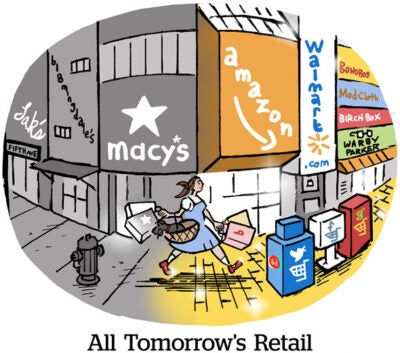Here’s today’s AdExchanger.com news round-up… Want it by email? Sign up here.
At Your Service
Amazon Ads has a new product called Amazon Retail Ad Service – which is notable because it licenses Amazon ad tech to other retailers.
The product is in beta, per the release, and retailers testing it include iHerb (vitamins and supplements), Oriental Trading Company (party supplies) and Weee! (an online Asian supermarket). Not a lot of brand-name power, but Tillys, an American clothing chain, will be using it soon, the release is quick to note.
Retailers that use this product could be seen as acquiescing to Amazon, in a way. Once upon a time, most retailers wouldn’t even allow a vendor to sit on AWS with their data. Now, their sites carry Amazon ad tech tags.
Mind Over Meta
Meta’s decision to scrap fact-checking may not shift marketers much. But that’s because they feel a bit stuck, agency buyers tell Adweek.
Unlike in 2020, when Fortune 500 brands led a boycott against Facebook over ads placed alongside hate speech and misinformation, advertisers don’t feel they wield the same kind of power now, nor do they seem interested in making a stand.
Since 2020, Meta has only increased its share of ad budgets. At this point, many marketers invest enough with Meta to make it nearly impossible to walk away. Wpromote, for example, spends between 65% and 70% of its social budget on Meta.
And where could budgets go if not to Meta? Advertisers already spend boatloads on Google, and one of the main alternatives to Facebook and Instagram – TikTok – may not be legally available in the US much longer.
But that doesn’t mean marketers aren’t considering their options. Ten percent of clients at performance agency We Are Rival may pause their Meta ads. Also, according to the agency, since 2023, Meta’s CPMs have shot up to between $30 and $50.
At those rates, an advertiser might as well just go with premium CTV instead.
Disney’s CES Showcase
This week, Disney held its annual ad tech dog-and-pony show at CES in Las Vegas.
For Disney (and other networks), CES is a chance to stand out from the competition and attract more interest – and ad budgets – from brands and buyers. This year, Disney used its stage at CES to showcase its global scale, programmatic chops and live sports capabilities.
Disney now has 157 million global ad-supported subscribers across its streaming portfolio (Disney+, ESPN+ and Hulu). It’s been more than two years since Disney+ introduced ads, following closely on the heels of Netflix, which has 70 million ad-supported monthly active users (different from subscribers).
Disney is also pushing global adoption of its ad tech stack. Its audience graph and targeting segments are now available in all regions with Disney+, and thousands of brands are using BridgeID, a new identifier Disney launched last year.
Meanwhile, earlier this week, Disney announced a tool to manage data fragmentation and create new ways to bid on live streaming sports impressions.
But Wait! There’s More
Meta’s overtly political decision to remove its third-party fact-checking program led to an explosion of Google searches for deleting Facebook and Instagram. [TechCrunch]
Microsoft launches two retail platforms ahead of next week’s National Retail Federation conference. [MediaPost]
What to know about TikTok’s argument to the Supreme Court – happening today – against the potential ban. [WSJ] Meanwhile, TikTok says it plans to shut down in the US unless the Supreme Court strikes down the law forcing it to sell. [CBS News]
Google will decrease search ratings for sites and links that use AI-generated content, including third-party content that is generated to create backlinks. [Search Engine Roundtable]
Hacked files from location data company Gravy Analytics include data from thousands of iOS and Android apps, including Candy Crush, Tinder, pregnancy tracking apps and religious prayer apps. [404 Media]













